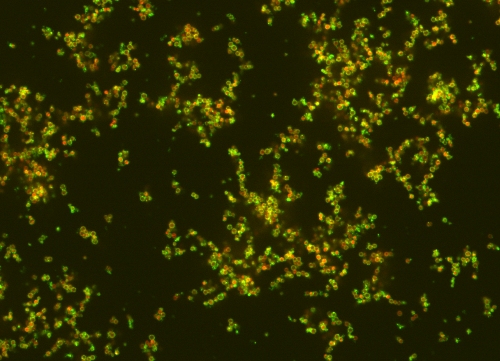A team of scientists from Massachusetts Institute of Technology and Brigham and Women’s Hospital has designed new nanoparticles that are capable of bypassing the immune system and entering into infection sites to deliver a targeted antibiotic attack.
 Nanoparticles, in green, targeting bacteria, shown in red. (Image: Aleks Radovic-Moreno)
Nanoparticles, in green, targeting bacteria, shown in red. (Image: Aleks Radovic-Moreno)
These nanoparticles can reduce the side effects of certain antibiotics and provide protection to the beneficial bacteria. They are made of a polymer layered with polyethylene glycol (PEG), a compound widely utilized for delivering drugs due to its non-hazardous nature and ability to enable nanoparticles to traverse the bloodstream by bypassing the immune system.
These antibiotic-carrying nanoparticles can also alter their charge with respect to their surroundings. For instance, they gain a negative charge during their circulation in the bloodstream and get a positive charge when they come into contact with an infection site, enabling them to strongly attach to bacteria and deliver the drugs.
The surroundings of bacteria are normally acidic, which triggers this switch. The nanoparticles feature a pH-sensitive layer composed of long amino acid histidine chains underneath the exterior PEG layer. When acidity increases, the polyhistidine molecule gets protons, thus gaining a positive charge. The nanoparticles start releasing the drug payload into the infection site after their attachment to bacteria.
In this research, the research team tested their nanoparticles to deliver vancomycin for treatment of drug-resistant infections. However, the nanoparticles can be designed to deliver different combinations of drugs and antibiotics. The nanoparticles also retained the efficacy of antibiotics, which normally lose their potency in an acidic environment. The researchers hope that their nanoparticles will be helpful in the treatment of infectious diseases, especially in developing nations. They also believe that their nanoparticles can tackle bacterial resistance to antibiotics as they can deliver high doses.
Infection sites may also contain negatively charged proteins and tissue cells that tend to bind with nanoparticles, and this may prevent bacteria from binding to the particles. The research team is assessing the impact of this problem on the efficacy of the nanoparticle delivery. The team is testing the nanoparticles in animals to identify whether the particles can retain their pH-sensitivity and travel a long distance to reach their targeted sites.
Source: http://web.mit.edu/